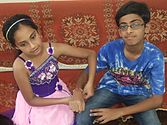Raksha Bhandan
| Raksha Bandhan | |
|---|---|

Examples of rakhi
|
|
| Official name | Raksha Bandhan. |
| Also called | Rakhi, Rakhri |
| Observed by | Religious festival: Hindus |
| Type | Indian and Nepali |
| Celebrations |
Religious: sister and brother get together, tie rakhi on wrist, perform aarti, mark tilak, brother promises to protect sister, sister feeds brother, brother gives gift, hugs Multicultural: tying rakhi, giving gifts, honoring relationships of siblings |
| Date | Purnima (full moon) of Shrawan |
| 2016 date | Thursday, 18 August; 2 Bhadra 2073 B.S as of Hindu lunar Nepali calendar |
| 2017 date | Monday, 7 August |
| 2018 date | Sunday, 26 August |
| 2019 date | Thursday, 15 August |
| Related to | Bhai Duj; Bhai Tika |
The key rituals of Raksha Bandhan. In the first image, the rakhi is evident on the brother's wrist.
|
|||||
Raksha Bandhan (Nepali: रक्ष्या बन्धन ; Marathi: रक्षा बंधन ; Hindi: रक्षा बन्धन), also called as Raksha Bandhana (Kannada: ರಕ್ಷಾ ಬಂಧನ), Rakhi Purnima , (Punjabi: ਰੱਖੜੀ) Rakhri or simply Rakhi in many parts of India and Nepal, is a Hindu religious and secular festival. In simple words, Raksha bandhan means "bond of protection".
The festival celebrates the love and duty between brothers and sisters. It is also popularly used to celebrate any brother-sister type of relationship between men and women who may or may not be biologically related. The festival is also observed by Jains as a religious festival, as on Raksha Bandhan, Jain priests give threads to devotees. The Brahmins and Bahuns (Vedic Brahmins) of Nepal and North India change their Janai on this occasion.
The festival is also celebrated by many communities as a secular festival. This secular aspect is observed among all people, irrespective of their religion, in West Bengal and Punjab. Various fairs are held in Punjab to mark the occasion.
On Raksha Bandhan, a sister will tie a rakhi (sacred thread) on her brother's wrist. This symbolizes the sister's love and prayers for her brother's well-being, and the brother's lifelong vow to protect her. The festival falls on the full moon day (Shravan Poornima) of the Shravan month of the Hindu lunisolar Nepali calendar. Raksha Bandhan is primarily observed in northern and western India, Mauritius and major parts of Nepal. It is also celebrated by Hindus in parts of Pakistan, and by some non-resident Indians and non-resident Nepalis around the world.
...
Wikipedia




